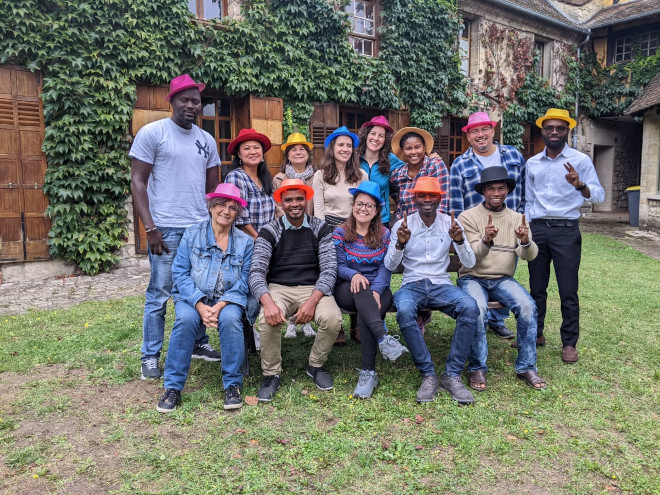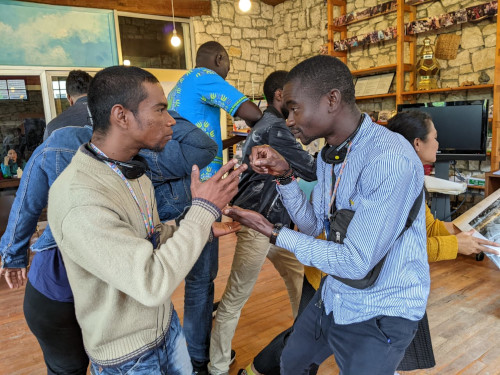A New Start

In September 2022, Jean-Michel Kantoussan — a member of ATD Fourth World’s Volunteer Corps in Senegal — participated in a training session at the ATD Fourth World International Centre in Méry-sur-Oise, France. Below he describes his experience.
From its inception, ATD Fourth World has invested heavily in the development of its members.
At each stage of operations, ATD Fourth World’s training team provides gatherings of various lengths. During these gatherings the participants — the majority of whom are members of the Volunteer Corps — reflect together on the actions they take, from team life to the questions and challenges that arise on a daily basis.
We dedicate this article to Audrey.
By Jean-Michel Kantiussan
“Renfort”
In September, 2022, a group of Volunteer Corps members met at ATD Fourth World’s International Centre in Méry-sur-Oise, France. They did so to take part in a training session offered to ATD Fourth World members. Participants came from Mauritius, Madagascar, Senegal, Burkina Faso, the Democratic Republic of Congo, Bolivia, and France. One person who unfortunately had not been able to obtain a visa, followed part of the training virtually.
These sessions, better known as “RENFORT” are international meetings organised by ATD Fourth World’s training team. The name is a play on words: it uses the first three letters from the French word “rencontre” (REN), meaning meeting “together”, with the first three of the French word “formation” (FOR), which means “training”.
Deepening our understanding
The goal of the training session was to develop our ability to respond to the needs of families living in poverty.
It provided a place to work together and share knowledge on multiple topics, allowing us to share the experiences and journeys of one another to better understand our shared commitment to those in extreme poverty. Some of the more experienced members of the Volunteer Corps also deepened our understanding of several topics by sharing their considerable insight.
Conditions for productive dialogue and debate were ensured by the adoption of practical tools and an adapted methodology. For example, at the beginning of each day, we would write our “benchmarks”: these routine evaluations allowed us to consider past feedback and further explore issues. Additionally, experienced members of the Volunteer Corps would actively examine the ideas we discussed, raising numerous new questions and encouraging stimulating debates.
Sharing knowledge
We began “Renfort” by each presenting the activities of our various ATD Fourth World teams across the world. The exercise allowed us to draw attention to the creativity that families living in poverty demonstrate every day.
On the second day, we worked together on a series of questions ATD Fourth World Volunteer Corps members often ask themselves: what kind of relationships should we establish with families living in extreme poverty? How do we establish them? And who are we in relation to these families?
We each shared our stories and listened to one another. The story of one participant in particular caught our attention. Being in a place where she was not familiar with the language, she faced issues communicating with families. However, she succeeded in devising an innovative solution and instead opted to communicate with the families by drawing in her workbook. Despite occasional misunderstandings, she was not discouraged, and she succeeded in forming strong bonds with them.
The third day was dedicated to the theme of collective action. We explored the question: how can we collaboratively work with families living in poverty to find solutions? One participant described his team’s experience in the Central African Republic, where they created a Commission for Education (made up of Volunteer Corps members, families, and ATD Fourth World allies) in order to work together on the issues facing the local education system. They went on to meet with authorities and teachers, advocating for keeping children in school for as long as possible and building schools.
A universal project
On the fourth day, we explored the topic of team life, aiming to collaborate together how to create a space for continual dialogue in daily life. Daniel Fayard, an ATD Fourth World Volunteer Corps member since 1969, presented on this topic. He took from the teachings of Joseph Wresinski and the first collaborative writings of ATD Fourth World.
Joseph Wresinski, the founder of ATD Fourth World, had himself lived in extreme poverty. However, it was when he moved to Noisy-le-Grand, France in July 1956 that he first encountered “mass poverty”. At the homeless camp in Noisy, he met 250 families, all living in similar situations of extreme poverty. He realised there the vital importance of a sense of global togetherness. In September 1964, the first conference of ATD Fourth World took place, during which the founding principles were written. This work introduces the concept of “forming a team together” for the first time, yet it does not explicitly reference the term “universal.”

Concluding thoughts
At the end of the meeting, everyone appreciated the participative nature of the session, with one participant confiding in us that she believes she thrives in such meetings. Another shared that “the “Renfort” gives confidence and teaches [Volunteer Corps members how] to inspire confidence in others.”
With each of us coming from a different country, we all felt like one big multicultural family. For many, this session represented a rejuvenation. We had a greater understanding of what we might encounter in our work as Volunteer Corps members.
This training prepared us and equipped us with tools and techniques to support our respective teams and the families we work alongside.

